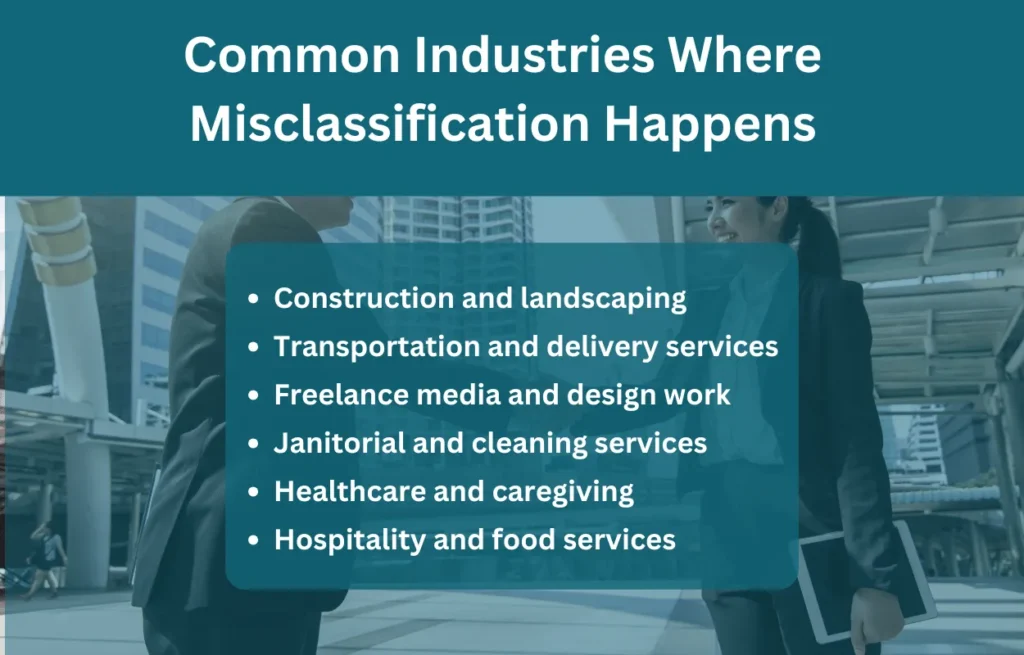Oregon Independent Contractor Laws: What Workers and Businesses Must Know
In the modern gig economy, more workers than ever are classified as independent contractors. But in Oregon, misclassifying employees as independent contractors can have serious legal and financial consequences. Whether you’re a business owner or a worker trying to understand your rights, it’s essential to grasp how Oregon independent contractor laws apply.
At Meyer Employment Law, we represent workers across Oregon who have been misclassified and denied wages, benefits, or legal protections. If you’re unsure whether you’re truly an independent contractor under Oregon law, contact our team today for a confidential consultation.
Also Read:
Oregon Labor & Employment Laws: What You Need to Know
Overtime Laws in Oregon & How to Calculate Overtime Pay
Oregon Unpaid Sales Commission Disputes
What Is an Independent Contractor in Oregon?
An independent contractor is a person who provides services for compensation but is not under the direction and control of the hiring entity in the same way as an employee. While this distinction might sound simple, Oregon applies strict and specific criteria to determine whether someone qualifies as an independent contractor.
Under ORS 670.600, Oregon’s primary independent contractor statute, the law outlines a multi-part test that must be met before a worker can be lawfully classified as an independent contractor.
The Oregon Independent Contractor Test
To be considered an independent contractor in Oregon, a worker must satisfy all of the following requirements:
1. Freedom from Control
The individual must be free from direction and control over how the service is performed—both under the contract and in practice.
2. Separate Business
The individual must operate an independently established business. This includes having at least three of the following:
- A business location separate from the client
- Licenses or certificates for the profession
- The right to hire others and contract independently
- Advertising or offering services to the public
- Ownership of tools or equipment used in the service
- The ability to set the price for services
If these requirements aren’t met, the person is presumed to be an employee—not an independent contractor.
Why MisclassificationMatters
Misclassifying employees as independent contractors can deprive workers of:
- Minimum wage and overtime pay
- Workers’ compensation coverage
- Unemployment insurance benefits
- Family and medical leave protections
- Protection from discrimination and retaliation
Businesses may think classifying a worker as an independent contractor saves money on payroll taxes or benefits—but it can lead to costly penalties, lawsuits, and back payments if challenged.

Common Industries Where Misclassification Happens
Some industries are more prone to misclassification, including:
- Construction and landscaping
- Transportation and delivery services
- Freelance media and design work
- Janitorial and cleaning services
- Healthcare and caregiving
- Hospitality and food services
In many cases, businesses retain significant control over the worker’s schedule, methods, or tools—signs that the worker should be classified as an employee under Oregon law.
Legal Protections for Misclassified Workers
If you believe you’ve been misclassified, you may be entitled to compensation. Oregon workers who should have been classified as employees can pursue claims for:
- Unpaid wages and overtime
- Reimbursement for business expenses
- Retroactive benefits (such as sick leave or health insurance)
- Penalties and interest
- Attorney’s fees and court costs
In many cases, multiple workers in the same company may be affected, potentially opening the door for class action lawsuits.

What to Do If You Suspect Misclassification
If you’re unsure whether you’ve been properly classified, take these steps:
- Review Your Work Arrangement
Look closely at your contract, job duties, and how much control the company has over your day-to-day work. - Document Everything
Keep records of communications, payments, work schedules, and who provides tools or equipment. - Seek Legal Advice
Misclassification cases can be complex. Consulting with an experienced employment attorney is the best way to understand your options.
At Meyer Employment Law, we’ve helped Oregon workers recover unpaid wages and fight back against employer abuse of the independent contractor label.
Protecting Worker Rights in Oregon
The line between employee and independent contractor isn’t always clear but Oregon law provides strong protections against misclassification. If you’ve been denied basic workplace rights because of your classification, you may have legal recourse.
Meyer Employment Law is committed to helping Oregon workers navigate the complexities of employment law. We offer experienced, compassionate legal support for those who’ve been misclassified and want to assert their rights. Contact us today to schedule a consultation and learn how we can help.



